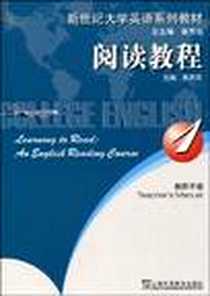《阅读教程1(教师手册)》
《阅读教程1(教师手册)》
出版时间:2007-12
出版社:上海外语教育出版社
作者:黄源深 编
页数:176
字数:309000
《阅读教程1(教师手册)》前言[E]
“新世纪大学英语系列教材”《阅读教程》是根据教育部高等教育司颁发的《大学英语课程教学要求》编写的,共分四册,供大学英语教学基础阶段使用,和《综合教程》、《视听说教程》、《写作教程》及《快速阅读》等一起,共同实现《大学英语课程教学要求》规定的“一般要求”的教学目标。
本教材力求体现以下特色:
1.紧扣《大学英语课程教学要求》,聚焦阅读课的中心任务,集中提高学生获取信息的能力和阅读理解能力,并让学生通过自主学习提高对四、六级考试阅读题的解题能力。
2.注重人文主义教育,通过选取生动有趣的故事,突出向善、向上、爱人、助人、乐观进取、服务社会等主题,使学生在学习语言的同时塑造自己的性格,发展健康的个性,提高自身素质。
3.注意为学生自主学习创造条件,除了注重课文的趣味性之外,还特别设计了Reading for Pleasure部分,提供小故事、小幽默、文字游戏等材料,使学生想读、爱读,以便养成阅读习惯。
4.注重跟踪学生的阅读理解能力,每个单元的结尾都有多道阅读理解自测题,并附有总分统计,方便学生随时自测,了解自己的阅读理解能力。
《阅读教程》力求完成《大学英语课程教学要求》所赋予的任务,在多门英语基础课中扮演好自己的角色。但理想和现实之间始终存在着矛盾,缺陷和疏漏永远是我们必须面对的事实,对这部教材来说也是如此。为此,我们诚恳地希望读者不吝指谬。
《阅读教程1(教师手册)》内容概要[E]
新世纪大学英语系列教材是按照《大学英语课程教学要求》,由外教社组织国内十余所著名高校英语教学专家,邀请国际知名视听教学专家,为我国大学生度身打造而成。本书是科学性、系统性和时代性的完美体现:以国内外先进外语教学理论为指导,融多种教学模式和手段为一体,满足一般要求、较高要求和更高要求的分层次教学需要。选材贴近时代、贴近生活;强化听说,注重听、说、读、写、译等技能协调发展;练习编写充分体现实用性、新颖性和可操作性。语言能力和文化素质的同步提升:注重培养学习者的英语思维习惯,开拓跨文化交际视野,实现语言综合应用能力和人文素养的全面提高。分类指导和因材施教的教学原则:综合、视听说、阅读、写作、快速阅读等主干教程和经贸、文化类选修课教程,涵盖语言知识、应用技能、学习策略和跨文化交际,充分满足个性化教学的需要,有助于学生提高语言综合应用能力,从容应对各级语言能力测试。基于计算机和课堂的教学模式:提供完整、多元、立体化的英语教学平台,个性化的学习光盘、方便实用的电子教案、丰富多样的网络资源,使课堂内外教与学充分体现交互性、自主式和合作型的新型教学模式,实现培养学生终身学习能力的教学目标。
《阅读教程1(教师手册)》书籍目录[E]
Unit 1 Part I Reading for Information
Pre-Reading Questions
Text: For Big Bruno, a Man We Can Look Up To.
Exercises
Reading Strategies (1): Skimming and Scanning Part II Reading for Pleasure
Text: I'm a Loser Baby!
Exercises Part III Homework
Enjoy Your Reading: A Flat Tire
Test Your ReadingUnit 2 Part I Reading for Information
Pre-Reading Questions
Text: My Miraculous Life
Exercises Part II Reading for Pleasure
Text: My Well-Balanced Life on a Wooden Leg
Exercises Part III Homework
Enjoy Your Reading: Paradox of Our limes
Test Your ReadingUnit 3 Part I Reading for Information
Pre-Reading Questions
Text: Working Christmas Day
Exercises
Reading Strategies (2): Guessing Unknown Words Part II Reading for Pleasure
Text: Hungry for Your Love
Exercises Part III Homework
Enjoy Your Reading: Hit the Floor
Test Your ReadingUnit 4 Part I Reading for Information
Pre-Reading Questions
Text: A Gift of Dreams
Exercises Part II Reading for Pleasure
Text: My Mother's Gift
Exercises Part III Homework
Enjoy Your Reading: Wise Old Gentleman and Noisy Kids
Test Your ReadingUnit 5 Part I Reading for Information
Pre-Reading Questions
Text: Maria Montessori, a Pioneer in Modem Education
Exercises
Reading Strategies (3): Speed Reading Part II Reading for Pleasure
Text: How to Get Your Dream Job
Exercises Part III Homework
Enjoy Your Reading: A Cursing Parrot
Test Your ReadingUnit 6 Part I Reading for Information
Pre-Reading Questions
Text: A Thief
Exercises ……Unit 7Unit 8Appendix 1 Glossary
《阅读教程1(教师手册)》章节摘录[E]
The Personal Qualities of a Teacher
Here I want to try to give you an answer to the question: What personal qualities are desirable in a teacher? Probably no two people would draw up exactly the same lists, but I think the following would be generally accepted.
First, the teachers personality should be pleasantly live and attractive. This does not rule out people who are physically plain, or even ugly, because many such have great personal charm. But it does rule out such types as the over-excitable, melancholy, frigid, sarcastic, cynical, frustrated, and over-bearing; I would say too, that it excludes all of dull or purely negative personality. I still stick to what I said in my earlier book: that school children probably "suffer more from bores than from brutes".
Secondly, it is not merely desirable but essential for a teacher to have a genuine capacity for sympathy —— in the literal meaning of that word; a capacity to tune in to the minds and feelings of other people, especially, since most teachers are school teachers, to the minds and feelings of children. Closely related with this is the capacity to be tolerant —— not, indeed, of what is wrong, but of the frailty and immaturity of human nature which induce people, and again especially children, to make mistakes.
Thirdly, I hold it essential for a teacher to be both intellectually and morally honest. This does not mean being a plaster saint. It means that he will be aware of his intellectual strengths, and limitations, and will have thought about and decided upon the moral principles by which his life shall be guided. There is no contradiction in my going on to say that a teacher should be a bit of an actor. That is part of the technique of teaching, which demands that every now and then a teacher should be able to put on an act —— to enliven a lesson, correct a fault, or award praise. Children, especially young children, live in a world that is rather larger than life.